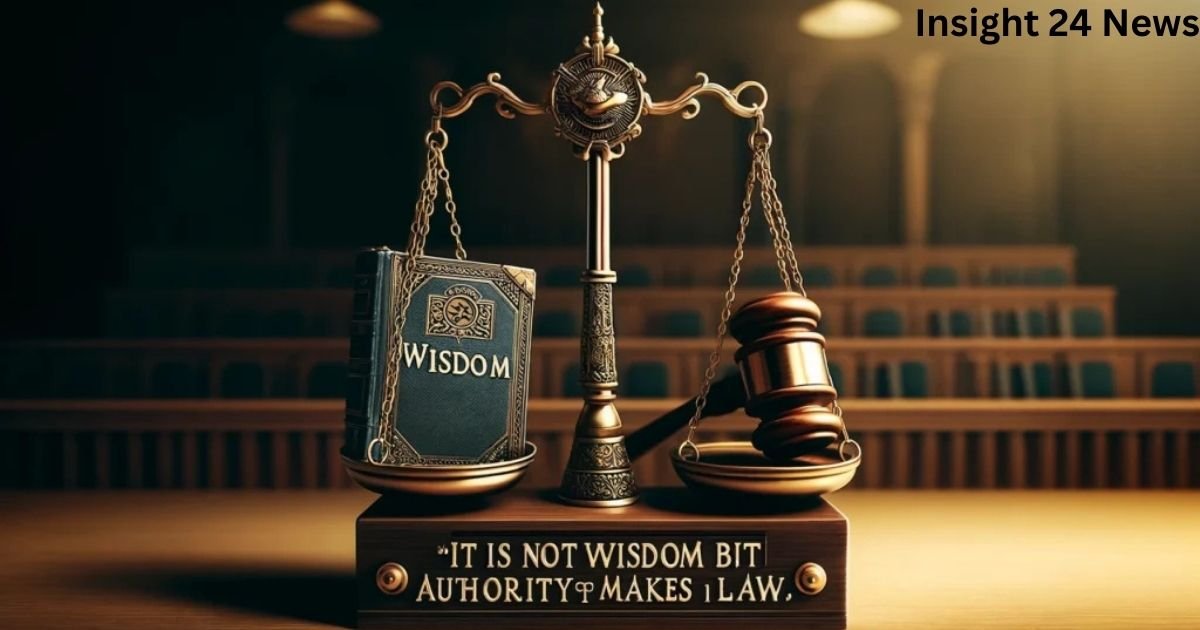Introduction
The quote “It Is Not Wisdom But Authority That Makes A Law” by T. Tymoff encapsulates a critical viewpoint on the nature of law and governance. At its core, this statement challenges the traditional notion that wisdom and moral reasoning should underpin legal systems. Instead, it posits that laws are primarily established by those in positions of power, irrespective of their wisdom or moral standing. This perspective invites us to critically examine the foundations of our legal frameworks and the motives behind the laws that govern us.
Understanding the role of authority in law-making is crucial for several reasons. Firstly, it sheds light on the dynamics of power in society and how laws can reflect the interests of those who hold authority rather than the common good. Secondly, it prompts discussions on the legitimacy of laws created under such authority—are they truly just and fair, or merely a reflection of power struggles? By exploring this quote, we can delve into the complexities of legal systems and the implications of prioritizing authority over wisdom.
What Does the Quote Mean?
Exploring the Meaning of the Quote
The essence of Tymoff’s quote revolves around the idea that authority, rather than wisdom, is the primary source of law. This statement can be interpreted as a critique of legal systems that claim to be based on rational or ethical foundations. In many societies, laws are enacted by legislatures or rulers who wield significant power, often without substantial input from the populace. This disconnect raises questions about the true nature of legality and morality.
In practical terms, this principle manifests in various ways. For example, authoritarian regimes may implement laws that serve their interests while disregarding ethical considerations. Conversely, democratic societies can also fall prey to similar dynamics, where laws are passed based on political expediency rather than genuine public welfare. This distinction between authority and wisdom is pivotal; it highlights the potential dangers of blind obedience to laws created by those in power, leading to systemic injustice and inequality.
Implications of Authority Over Wisdom
The implications of prioritizing authority over wisdom in law-making are profound. When laws are dictated solely by those in power, they can often perpetuate injustices and societal inequalities. For instance, laws that criminalize certain behaviors or disenfranchise specific groups can reflect the biases of those in authority rather than a collective societal consensus. This raises ethical questions about the legitimacy of such laws and the moral obligations of citizens to either comply with or resist them.
On the flip side, some legal systems do strive to integrate wisdom and ethical reasoning into their law-making processes. These systems often engage in public consultations, rely on expert opinions, and consider the broader societal impact of proposed laws. The contrast between authority-driven laws and those rooted in wisdom emphasizes the necessity for a balanced approach to law-making, one that considers the voices of the governed alongside the authority of lawmakers.
Who Wrote the Quote?

Biography of T. Tymoff
T. Tymoff is a figure whose insights into law and authority have sparked discussions in legal and philosophical circles. Although specific biographical details may be sparse, Tymoff’s contributions highlight the importance of understanding the relationship between power dynamics and legal systems. His work prompts a critical examination of how laws are formed and the motives behind them.
Tymoff’s background, likely rooted in legal or philosophical studies, positions him as a commentator on the intersections of power and morality in law. His observations challenge conventional beliefs about the wisdom that should guide legislative processes, suggesting that a more nuanced understanding of authority is necessary for a just society.
Context of the Quote
The quote “It Is Not Wisdom But Authority That Makes A Law” was likely articulated in a specific historical or social context where the role of authority in law-making was under scrutiny. It serves as a critique of legal systems that prioritize the voices of the powerful over the collective wisdom of the people.
The significance of this quote within Tymoff’s body of work can be seen in its implications for contemporary discussions on governance, legal authority, and ethical considerations in law-making. It challenges readers to consider the legitimacy of laws that arise from authority without a foundation of moral reasoning or public consent. By situating this quote within Tymoff’s broader philosophical inquiries, we can better appreciate its relevance to ongoing debates about the nature of justice and authority in modern societies.
Connection to Leviathan
Understanding Hobbes’ Leviathan
Thomas Hobbes’ Leviathan is a foundational text in political philosophy, presenting a social contract theory that emphasizes the necessity of a strong central authority to maintain order in society. Hobbes argues that without such authority, life would devolve into chaos, famously describing life in a state of nature as “solitary, poor, nasty, brutish, and short.” In this context, authority becomes paramount for establishing laws and maintaining peace.
Hobbes’ philosophy posits that individuals consent to surrender certain freedoms to a sovereign power in exchange for protection and order. This notion of authority resonates with Tymoff’s quote, as both suggest that the legitimacy of law stems not from wisdom or moral reasoning but from the power vested in those who govern. By analyzing Leviathan, we can better understand the implications of prioritizing authority in legal systems and the potential consequences for individual freedoms and societal justice.
Comparative Analysis
Tymoff’s quote invites a comparative analysis with Hobbes’ assertions in Leviathan. While both thinkers acknowledge the centrality of authority in law-making, they differ in their implications for ethical governance. Hobbes advocates for an absolute authority to prevent disorder, while Tymoff raises critical questions about the legitimacy of laws imposed by authority without ethical considerations.
The alignment of Tymoff’s ideas with Hobbes’ theories underscores a shared recognition of the power dynamics inherent in legal systems. However, Tymoff’s perspective introduces a cautionary note about the potential dangers of unbridled authority. By exploring these connections, we gain insight into the ongoing debate surrounding the balance between authority and wisdom in governance, prompting reflections on how contemporary societies navigate these complex issues.
Conclusion About It Is Not Wisdom But Authority That Makes A Law. T – Tymoff
The quote “It Is Not Wisdom But Authority That Makes A Law” by T. Tymoff serves as a powerful reminder of the intricate relationship between power and law. It challenges us to reconsider the foundations of our legal systems and the motives behind the laws that govern us. By understanding the implications of prioritizing authority over wisdom, we can better navigate the complexities of justice and governance.
In conclusion, the balance between authority and wisdom in law-making is critical for ensuring fair and just societies. As we reflect on this quote, it is essential to recognize that the legitimacy of laws depends not only on their origins but also on their adherence to ethical standards and the broader societal good. Encouraging ongoing discussions about the role of authority in our legal systems will be vital for promoting justice and equity in governance.
Call to Action
As readers reflect on the role of authority in their own legal systems, it is crucial to question the legitimacy of laws that lack a foundation of wisdom or ethical reasoning. Engaging in civic discourse, advocating for fair representation, and holding authorities accountable are essential steps toward a more just society. For those interested in further exploring these themes, a wealth of resources exists, including philosophical texts, legal analyses, and contemporary discussions on governance and authority. By fostering awareness and encouraging critical thinking, we can work toward legal systems that genuinely reflect the collective wisdom of society.
You Also Like It:
learn to sit back and observe. not everything need – tymoff
